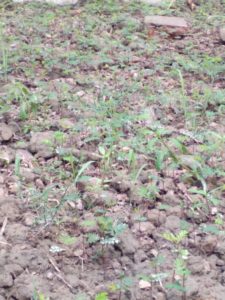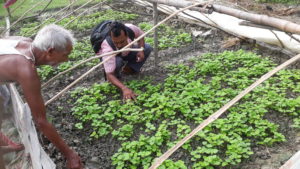

Roadside Plantation: A Socio- Economic Venture by Mukti
Realizing the present scenario, Mukti has taken an initiative to plant trees that will play an extremely supportive role by improving livelihoods of poor communities. Mukti is encouraging the women of SHG (Self Help Group) to plant trees of indigenous species, nurture them and then earn tree credits accordingly. Given the huge potential of agro forestry in India, intelligently designed policy interventions can go a long way in increasing income levels of the farmers and creating additional employment opportunities in rural areas.
Objectives of the program:
- Employment to local people
- To reduce the impacts of air pollution and dust as trees and shrubs are known to be natural sink for air pollutants
- Under severe climatic conditions (such as cyclones), selected roadside trees can form wind breaks and shelter belts to protect crops, and help to reduce climatic excesses and soil erosion at the embankment slopes. They can restore some ecological diversity to areas of agricultural monotony.

Mukti has 97 nurseries over 97 katha of land where 10,000-11,000 grains are planted in each nursery. After some time 5,000-6,000 saplings will grow in each nursery. Mukti will be able to produce approx 5,00,000- 6,00,000 saplings in 97 nurseries.
Mukti nurseries are spread across:
| Block | Branch | Gram Panchayat | Number of nurseries |
| Patharprotima | Herembogopalpur | Herambagopalpur | 20 |
| Brajaballavpur | Brajaballavpur | 5 | |
| Jaynagar II | Sonatikari | Nalgora | 10 |
| Ghotiharania | 10 | ||
| Kultali | Bhubannagar | 10 | |
| Maipith | 10 | ||
| Mathurapur I | Raidighi I | Mondalpara | 3 |
| Kumrapara | 4 | ||
| Naluya | 5 | ||
| Mathurapur II | Purba Sridharpur | Nagendrapur | 10 |
| Kankandighi | 10 | ||
| 4 | 6 | 11 | 97 |

The seedlings of Mahogani, Sishu, Amloki, Gayanim, Krishnachura, Radhachura, Gamaru, Bakul etc. are planted in these nurseries. 970 women SHG members (10 in each nursery) are nurturing these seedlings under the supervision of Mr. Jagannnath Das.
Roadside plantation acts as a buffer between the people and government- owned forests. In future, these saplings will be delivered to the Government’s NREG (National Rural Employment Guarantee Program) project resulting job opportunities for 10,000-12,000 people.
Project Activities
- A village for independent and enterprising women (A VIEW) (5)
- About Mukti (4)
- Accreditation (14)
- AGM (63)
- Agriculture Reforms (124)
- Ambulance Service (2)
- Amplifying Community Voices (67)
- Awards (15)
- Awareness and Empowerment (136)
- Awareness drives (60)
- Bio-Village-Kankandighi (10)
- Careers (14)
- Chick Rearing Programme for Marginalised Women (16)
- CHILD (23)
- Climate Resilience River Embankment (46)
- Covid-19 (74)
- Cultural Shows (7)
- Cyclone Aila (13)
- Cyclone Amphan (44)
- Cyclone Bulbul (30)
- Cyclone Dana (3)
- Cyclone Remal (12)
- Cyclone Response & Recovery (90)
- Cyclone Tolerant Houses (15)
- Cyclone Yaas (57)
- Disaster Recovery (264)
- Editorial (57)
- Editorial by Abir Biswas (1)
- Editorial by Amit Kumar Dey (3)
- Editorial by Ananya Chatterjee (3)
- Editorial by Ankita Kothiyal (4)
- Editorial by Debabrata Halder (1)
- Editorial by Dr. Alokananda Ghosh Sengupta (2)
- Editorial by Kasturi Bakshi (1)
- Editorial by Monami Mitra (1)
- Editorial by Nandita (3)
- Editorial by Pampa Karmakar (1)
- Editorial by Pranay Patra (1)
- Editorial by Prof. Pradeep Ray (1)
- Editorial by Ranitendranath Tagore (1)
- Editorial by Sankar Halder (14)
- Editorial by Satyajit Ray (7)
- Editorial by Sohini Mehta (1)
- Editorial by Sonamon Basu (3)
- Editorial by Soumitra Bose (2)
- Editorial by Subhankar Basu (1)
- Editorial by Supriyo Banerjee (3)
- Editorial by Ujjwal Maity (2)
- Education and Enrichment (418)
- Environment and Resilience (127)
- Featured Activities (24)
- Gram Clinic (9)
- Health Water & Sanitation (97)
- HOPE (10)
- Impact Stories List (109)
- Integrated Development (219)
- International Management Institute (IMI) (2)
- Jal hi Kal (6)
- Kitchen Gardening (16)
- Livelihood & Enablement (220)
- MCDF (119)
- Medical Camp (45)
- MIT (8)
- MKSS (50)
- MSS (146)
- Mukti Academia (5)
- Mukti Academy (2)
- Mukti Craft (18)
- Mukti Cultural (2)
- Mukti Employment Exchange (MEE) (9)
- Mukti Fresh (15)
- Mukti Gram - Egra (11)
- Mukti Gram - Purbashridharpur (170)
- Mukti Green Defense in Sundarbans (11)
- Mukti Yoga (12)
- Mukto Dhara (2)
- Northumbria University (2)
- Obituary (6)
- Observance Days Celebration (53)
- Organic Farming & Training Support (45)
- Pond Rejuvenation (20)
- Prerana (1)
- Prerna (4)
- Projects For Mukti Wide (7)
- Queen Mary University of London (1)
- Rights and Special Needs (113)
- Run for Cause (13)
- Run4SafeFood (7)
- SDF (6)
- Shahoshini (9)
- Skill & Enterprise Development (21)
- Smart lab (5)
- Social Stock Exchange (2)
- Social Workers' Convention (1)
- Sundarbans Green (SUN-G) (15)
- Sunderban development fair project (4)
- Surya (13)
- Sustainable Agriculture Movement (63)
- SWAS-2-0 (19)
- Swastha Shongini (33)
- Swavalamban Accelerator in Sundarbans (SWAS) (21)
- Tour for Cause (45)
- TSS (198)
- UDAAN (8)
- Uncategorized (99)
- University of Calcutta (1)
- Value Education (12)
- Valued Partners (3)
- Vocational Trainings (15)
- VOICE (14)